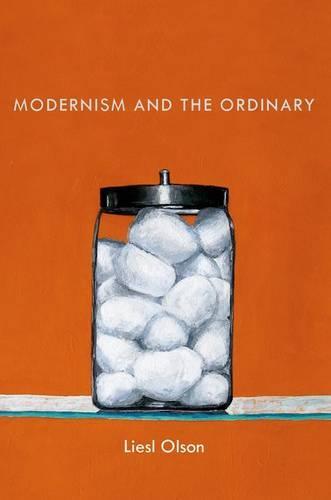Full Product Details
Author: Liesl Olson (Harper-Schmidt Fellow and Assistant Professor, Harper-Schmidt Fellow and Assistant Professor, University of Chicago)
Publisher: Oxford University Press Inc
Imprint: Oxford University Press Inc
Dimensions:
Width: 15.60cm
, Height: 1.30cm
, Length: 23.40cm
Weight: 0.336kg
ISBN: 9780199349784
ISBN 10: 0199349789
Pages: 216
Publication Date: 03 April 2014
Audience:
College/higher education
,
Professional and scholarly
,
Undergraduate
,
Postgraduate, Research & Scholarly
Format: Paperback
Publisher's Status: Active
Availability: To order

Stock availability from the supplier is unknown. We will order it for you and ship this item to you once it is received by us.
Reviews
Modernism and the Ordinary is exceptionally well-written, elegantly organized, and compelling in its argument that critical accounts of literary modernism have failed to recognize in the major works of that period the centrality of ordinary experience and everyday life. -Rebecca Walkowitz, Rutgers University In this masterful study, Liesl Olson shows that modernist writers' attention to the everyday entailed a complex struggle to retain the ordinariness of the ordinary-to resist literary representation's drift toward the epiphanic, the momentous, the teleological. Olson's clear-eyed, elegant readings recast in wonderfully unexpected ways twentieth-century art's relation to the mundane life that furnished its most vital, yet most exacting, material. -Douglas Mao, Johns Hopkins University
"""Modernism and the Ordinary is exceptionally well-written, elegantly organized, and compelling in its argument that critical accounts of literary modernism have failed to recognize in the major works of that period the centrality of ordinary experience and everyday life.""-Rebecca Walkowitz, Rutgers University ""In this masterful study, Liesl Olson shows that modernist writers' attention to the everyday entailed a complex struggle to retain the ordinariness of the ordinary-to resist literary representation's drift toward the epiphanic, the momentous, the teleological. Olson's clear-eyed, elegant readings recast in wonderfully unexpected ways twentieth-century art's relation to the mundane life that furnished its most vital, yet most exacting, material.""-Douglas Mao, Johns Hopkins University"
Modernism and the Ordinary is exceptionally well-written, elegantly organized, and compelling in its argument that critical accounts of literary modernism have failed to recognize in the major works of that period the centrality of ordinary experience and everyday life. Rebecca Walkowitz, Rutgers University In this masterful study, Liesl Olson shows that modernist writers' attention to the everyday entailed a complex struggle to retain the ordinariness of the ordinary-to resist literary representation's drift toward the epiphanic, the momentous, the teleological. Olson's clear-eyed, elegant readings recast in wonderfully unexpected ways twentieth-century art's relation to the mundane life that furnished its most vital, yet most exacting, material. Douglas Mao, Johns Hopkins University
In this masterful study, Liesl Olson shows that modernist writers' attention to the everyday entailed a complex struggle to retain the ordinariness of the ordinary-to resist literary representation's drift toward the epiphanic, the momentous, the teleological. Olson's clear-eyed, elegant readings recast in wonderfully unexpected ways twentieth-century art's relation to the mundane life that furnished its most vital, yet most exacting, material. * Douglas Mao, Johns Hopkins University * Modernism and the Ordinary is exceptionally well-written, elegantly organized, and compelling in its argument that critical accounts of literary modernism have failed to recognize in the major works of that period the centrality of ordinary experience and everyday life. * Rebecca Walkowitz, Rutgers University *
Author Information
Liesl Olson teaches at The University of Chicago where she is a Harper-Schmidt Fellow and Assistant Professor in the Humanities Division.




